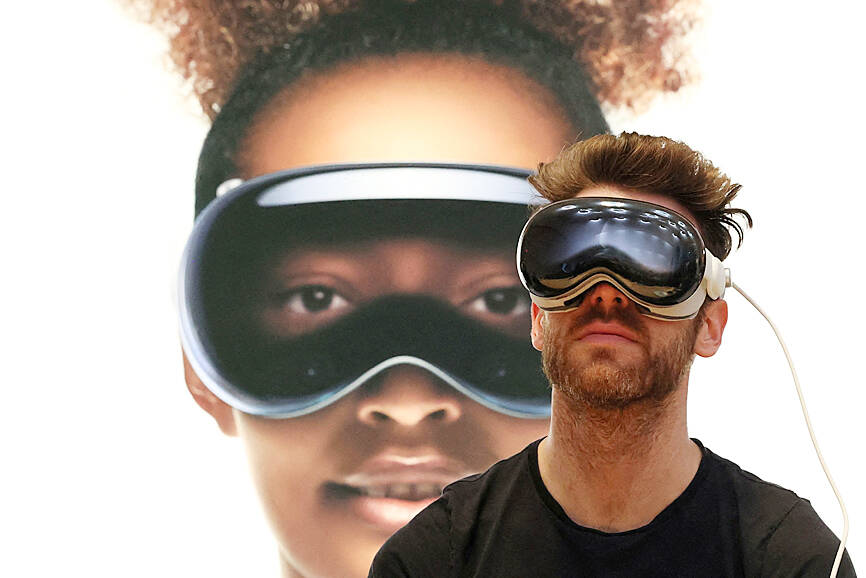Apple Inc’s limited release of the Vision Pro headset is fostering a resale market that is pricing the device far beyond its US$3,500 starting price.
On Japan’s Mercari marketplace, the base 256GB model sold for ¥800,000 (US$5,376), sellers on China’s Taobao (淘寶) are asking 36,000 yuan (US$5,017) and there is one seller on Singapore’s Lazada seeking S$8,500 (US$6,318) for the device.
In Hong Kong’s bustling Mong Kok, an electronics importer specializing in getting gadgets early asks for HK$35,800 (US$4,578), with the price shifting on a daily basis. His advice: best to wait.

Photo: REUTERS
Cupertino, California-based Apple put the Vision Pro on sale in a limited number of stores in the US at the start of this month, with an elaborate setup and customization process for each buyer. The company wants to ensure an optimal first experience with its virtual reality goggles — which it dubs a spatial computer, owing to the hand gestures used to control it.
Questions remain about how big the consumer market is for so-called extended reality (XR) devices, and especially ones with a price like the Vision Pro’s. However, the gadget’s early exclusivity is pushing prices up.
“Our observations indicate inflated prices on unofficial channels, reaching up to 40,000 yuan for Vision Pro units,” Counterpoint Research analyst Ivan Lam (林科宇) said. “However, these purchases likely represent a limited supply, originating from outside markets and deviating from typical consumer behavior.”
The drive to acquire an early unit of the new device comes from various sources, International Data Corp analyst Bryan Ma (馬伯遠) said.
Beyond dedicated Apple fans, overseas software developers as well as industry players and rivals would want to get hands-on experience quickly to figure out their next steps, Ma added.

CAUTIOUS RECOVERY: While the manufacturing sector returned to growth amid the US-China trade truce, firms remain wary as uncertainty clouds the outlook, the CIER said The local manufacturing sector returned to expansion last month, as the official purchasing managers’ index (PMI) rose 2.1 points to 51.0, driven by a temporary easing in US-China trade tensions, the Chung-Hua Institution for Economic Research (CIER, 中華經濟研究院) said yesterday. The PMI gauges the health of the manufacturing industry, with readings above 50 indicating expansion and those below 50 signaling contraction. “Firms are not as pessimistic as they were in April, but they remain far from optimistic,” CIER president Lien Hsien-ming (連賢明) said at a news conference. The full impact of US tariff decisions is unlikely to become clear until later this month

GROWING CONCERN: Some senior Trump administration officials opposed the UAE expansion over fears that another TSMC project could jeopardize its US investment Taiwan Semiconductor Manufacturing Co (TSMC, 台積電) is evaluating building an advanced production facility in the United Arab Emirates (UAE) and has discussed the possibility with officials in US President Donald Trump’s administration, people familiar with the matter said, in a potentially major bet on the Middle East that would only come to fruition with Washington’s approval. The company has had multiple meetings in the past few months with US Special Envoy to the Middle East Steve Witkoff and officials from MGX, an influential investment vehicle overseen by the UAE president’s brother, the people said. The conversations are a continuation of talks that

CHIP DUTIES: TSMC said it voiced its concerns to Washington about tariffs, telling the US commerce department that it wants ‘fair treatment’ to protect its competitiveness Taiwan Semiconductor Manufacturing Co (TSMC, 台積電) yesterday reiterated robust business prospects for this year as strong artificial intelligence (AI) chip demand from Nvidia Corp and other customers would absorb the impacts of US tariffs. “The impact of tariffs would be indirect, as the custom tax is the importers’ responsibility, not the exporters,” TSMC chairman and chief executive officer C.C. Wei (魏哲家) said at the chipmaker’s annual shareholders’ meeting in Hsinchu City. TSMC’s business could be affected if people become reluctant to buy electronics due to inflated prices, Wei said. In addition, the chipmaker has voiced its concern to the US Department of Commerce

STILL LOADED: Last year’s richest person, Quanta Computer Inc chairman Barry Lam, dropped to second place despite an 8 percent increase in his wealth to US$12.6 billion Staff writer, with CNA Daniel Tsai (蔡明忠) and Richard Tsai (蔡明興), the brothers who run Fubon Group (富邦集團), topped the Forbes list of Taiwan’s 50 richest people this year, released on Wednesday in New York. The magazine said that a stronger New Taiwan dollar pushed the combined wealth of Taiwan’s 50 richest people up 13 percent, from US$174 billion to US$197 billion, with 36 of the people on the list seeing their wealth increase. That came as Taiwan’s economy grew 4.6 percent last year, its fastest pace in three years, driven by the strong performance of the semiconductor industry, the magazine said. The Tsai